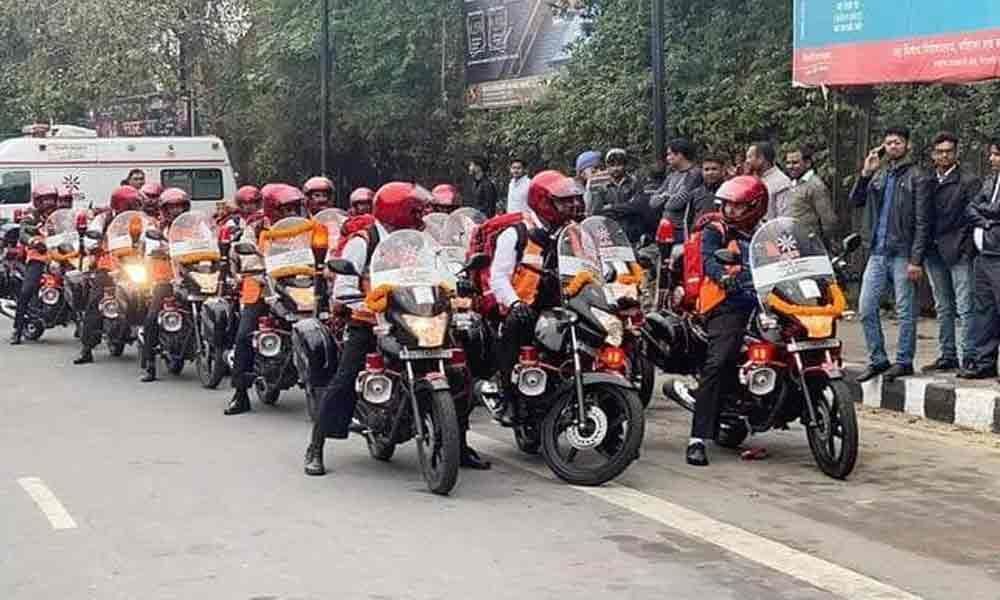Live
- Workshop on ‘Industry-Academia Practices in Civil Engineering’ concludes
- Revanth assures Kurma community of its due
- 204 cadets pass out of AFA
- Youngest chess king wins laurels for India
- FairPoint: Rahul’s rhetoric falls flat as PM Modi steals spotlight
- Notice issued to SGPC chief Dhami
- PM Surya Ghar scheme set to surpass a decade’s installation growth in a year
- Centre should probe Soros-Gandhis nexus
- Student held, released after counselling
- Thousands witness Sagara Harathi
Just In
ICMR launches bike-borne service to reach heart patients


The pilot project has been launched in a radius of three kilometres around the All India Institute of Medical Sciences (AIIMS).
New Delhi: The Indian Council of Medical Research (ICMR) on Thursday launched 'Mission DELHI', an emergency medical service, as part of which a motorbike-borne assistance unit can be quickly summoned for a person suffering heart attack or chest pain. The pilot project has been launched in a radius of three kilometres around the All India Institute of Medical Sciences (AIIMS).
Under Mission DELHI (Delhi Emergency Life Heart-Attack Initiative), a pair of motorcycle-borne trained paramedic nurses would be the first responders for treating heart attack patients. On getting a call, the pair would rush to the spot, gather basic information on the patient's medical history, conduct a quick medical examination, take the ECG, and establish a virtual connect with the cardiologists at AIIMS and deliver expert medical advice and treatment, AIIMS Director Randeep Guleria said.
While the emergency treatment is being provided, a CATS (Centralised Ambulance Trauma Services) ambulance will arrive and take the patient for further treatment. Even as the patient is on way to the hospital, doctors at AIIMS control centre will evaluate the data received from the nurses to establish further course of treatment.
ICMR has signed a memorandum with CATS for this project, ICMR Director General Balram Bhargava said. "The idea is to reach with medical help much faster, given the high-density traffic situation in the city where movement of four-wheeler ambulances becomes difficult. Motorcycle ambulances can reach people in narrow lanes in congested areas," Guleria said.
The idea has been tried in remote areas of the country but not specifically for reaching those with heart trouble. Guleria said the attempt is to reach patients within 10 minutes. The heart is like a room that pumps blood to the entire body. Before the blood is pumped to the body, it is pumped to the walls of the heart through three pipes (coronary arteries). If any of these pipes are clogged by clot, the tissues in that part of the heart die, Bhargava, a cardiologist, explained.
It is important to remove the clot that is stopping the blood flow. If the heart walls are damaged, they cannot be repaired. Clot busters are almost equal to angioplasty. Clot-buster medication is low-cost treatment whereas angioplasty is expensive. Clot busters can be given within a short time after a heart attack.
In this project, the clot buster will be given very soon even at home, Bhargava said. The average age of the occurrence of cardiac arrest in the Indian population is 53 to 55 years, about 10 years less than in the United States and Europe where it is 63 or 64.
Genetic predisposition is an important cause for this, but the high rates of smoking and chewing tobacco in India also contribute in a large way. Ninety per cent of chewing tobacco incidence in the world is in India, Bangladesh and Pakistan. Young heart patients that doctors see mostly have problems associated with tobacco use.

© 2024 Hyderabad Media House Limited/The Hans India. All rights reserved. Powered by hocalwire.com






